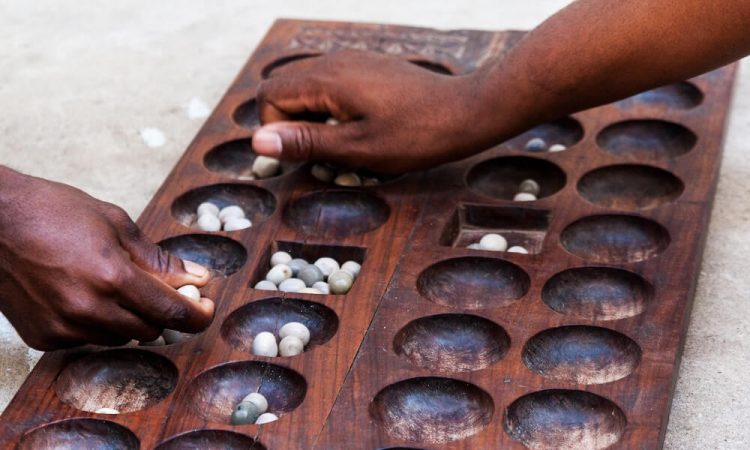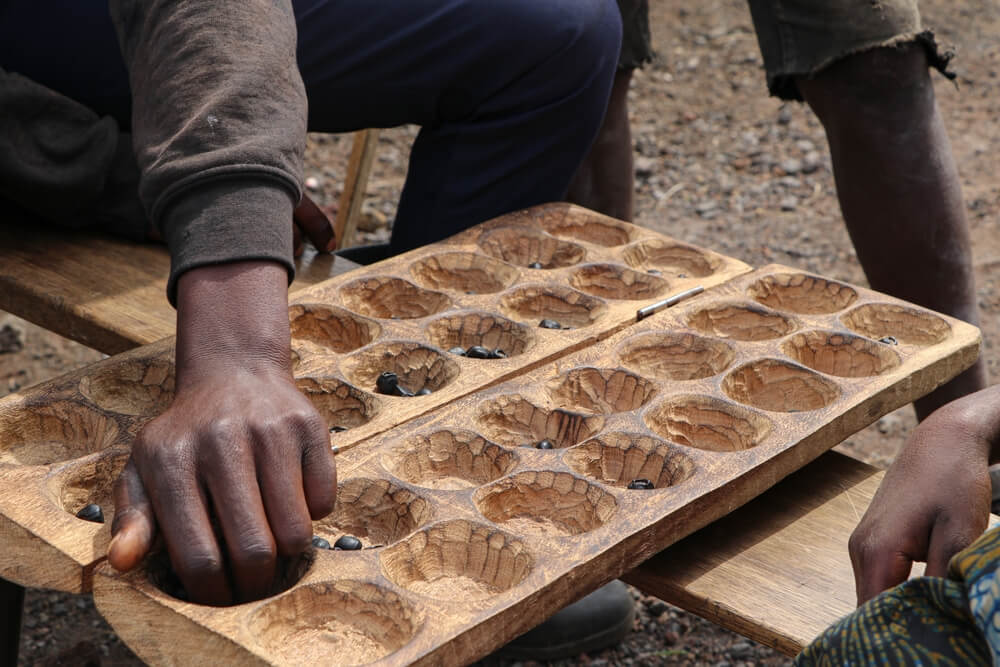
Mancala is an ancient board game that has captivated players worldwide for centuries with its simple, strategic gameplay. This guide introduces beginners to Mancala by exploring its history, rules, and strategies. From the basic board setup to advanced tactics, you’ll learn everything needed to enjoy this timeless game. We’ll also discuss international versions and highlight the cognitive benefits for all ages. Discover why Mancala remains a beloved pastime globally.
Understanding the Basics of Mancala
Mancala is a captivating traditional board game with a rich history that dates back thousands of years, believed to have originated in ancient Africa. The term “mancala” itself is derived from the Arabic word “naqalah,” meaning “to move,” which aptly describes the fundamental mechanic of the game. Mancala has been played in various forms across different cultures, each with its own unique set of rules and variations.
At its core, mancala is a strategy-based game typically played on a board comprised of two rows of small pits or holes, known as “houses.” Each player controls one side of the board and begins with an equal number of seeds or stones distributed among their houses. The primary objective is to capture more seeds than your opponent by strategically moving them around the board. This movement involves picking up all seeds from one house and sowing them into subsequent houses in a counter-clockwise direction.
Understanding mancala game rules can be straightforward yet deeply strategic. Players must decide carefully which house to start from, as this choice can impact future moves and potential captures. A key rule involves landing your last seed in an empty house on your side, which allows you to capture not only that seed but also any seeds directly opposite it on your opponent’s side.
Mancala’s enduring popularity lies in its simplicity paired with complex strategic possibilities, making it accessible for beginners while still challenging for seasoned players. As one delves into what mancala truly represents (a blend of cultural heritage and intellectual challenge) it’s easy to see why this traditional board game continues to captivate players worldwide today.
The Mancala Board and Setup
Mancala is a captivating and ancient board game that has been enjoyed for centuries across various cultures. To get started with Mancala, understanding the board setup and game pieces is essential. The traditional Mancala board consists of two rows of six small pits, known as “houses,” with a larger pit at each end called a “store” or “mancala.” Each player controls one row of houses and the store on their right.
In terms of setup, the most common version involves placing four stones in each of the twelve smaller pits at the start. This means you’ll need a total of 48 stones to begin playing. These stones can be made from various materials such as glass, wood, or even polished pebbles, adding to the aesthetic appeal of your Mancala set.
The design of Mancala boards can vary significantly, from simple wooden planks to intricately carved pieces that reflect cultural artistry. Regardless of its design, each board serves the same fundamental purpose: facilitating strategic gameplay that challenges players to outwit their opponents by capturing more stones in their mancala than their adversary.
How to Play the Game Effectively

Mancala is a timeless board game that blends strategy with simplicity, making it accessible yet challenging. Understanding the basic rules of mancala is essential for playing effectively. The game is typically played on a board with two rows of six pits, each filled with an equal number of stones. Players take turns picking up all the stones from one of their pits and distributing them one by one into subsequent pits in a counter-clockwise direction.
The turn sequence in mancala is crucial to grasp. If your last stone lands in your own store (the larger pit at the end of your row), you get another turn. This rule can be strategically used to control the flow of the game and maximize stone accumulation in your store.
Capturing stones in mancala occurs when you land your last stone in an empty pit on your side, directly opposite a pit filled with stones on your opponent’s side. When this happens, you capture all those stones along with the one from your final move and place them into your store. Mastering this capturing mechanism can significantly enhance your winning strategy for mancala.
A successful winning strategy for mancala involves planning several moves ahead and anticipating your opponent’s actions. Prioritize keeping as many options open as possible while aiming to control additional turns through strategic placement of stones into your store. Remember, practice makes perfect; as you play more games, you’ll develop a sharper sense for predicting outcomes and optimizing each move to outmaneuver opponents effectively.
Strategies and Tips to Master Mancala
Mancala, a timeless and strategic board game, offers players a unique blend of skill and planning. For beginners eager to master the game, understanding basic mancala strategies is crucial. Start by focusing on controlling your side of the board and aim to capture stones from your opponent’s side whenever possible. This not only increases your stone count but also disrupts their strategy.
As you advance, delve into more sophisticated tactics in mancala. One effective approach is to plan several moves ahead, anticipating your opponent’s responses. This foresight allows you to set traps or create opportunities for multiple captures in a single turn. Additionally, maintaining a balance between offense and defense can significantly improve your game skills.
Strategic planning in board games like mancala involves careful observation of the board state at all times. Pay attention to which pits are nearing emptiness; these can be pivotal for gaining an advantage or preventing an opponent from scoring big points. Regular practice and analysis of past games will further enhance your ability to adapt strategies dynamically during play.
Mancala Variations Around the World
Mancala, a game with ancient roots, has captivated players across the globe for centuries. While its core mechanics remain consistent (capturing seeds or stones by strategically sowing them into pits) numerous variants of the mancala game have emerged, each reflecting unique cultural influences and gameplay styles.
One of the most recognized international versions of mancala is Oware, widely played in West Africa and the Caribbean. Known for its strategic depth, Oware involves capturing opponents’ seeds to accumulate points, often requiring players to anticipate their opponent’s moves several turns ahead. This version emphasizes both strategy and social interaction, as it is traditionally played during community gatherings.
In contrast, Bao la Kiswahili from East Africa offers a more complex set of rules and a larger board setup. It is considered one of the most challenging variants due to its intricate strategies and multiple phases within a single turn. The cultural differences in gameplay are evident here; Bao requires not only skill but also patience and foresight.
Moving eastward to Asia, Kalah is a popular type of mancala that has gained traction worldwide due to its straightforward rules suitable for beginners yet offering enough complexity for seasoned players. Originating from North America but inspired by African traditions, Kalah simplifies some aspects while retaining competitive elements that appeal universally.
These diverse versions highlight how cultural nuances shape gameplay experiences across regions. Whether it’s through adapting rules or altering board designs, each variant offers players an opportunity to engage with different strategic challenges while celebrating the rich tapestry of global gaming traditions inherent in mancala’s enduring legacy.
The Benefits of Playing Mancala for All Ages
Mancala, a timeless board game with roots stretching back thousands of years, offers a wealth of benefits that make it an excellent choice for players of all ages. Among the most significant advantages are its educational benefits, which extend beyond mere entertainment. Playing games like Mancala can significantly contribute to cognitive skills development, making it an invaluable tool for both children and adults seeking mental stimulation.
One of the primary educational benefits of playing games such as Mancala is their ability to enhance strategic thinking. Players must plan several moves ahead and anticipate their opponent’s actions, which sharpens critical thinking and problem-solving skills. This aspect of cognitive skills development is crucial not only in academic settings but also in everyday decision-making processes.
Moreover, Mancala serves as a family-friendly game that encourages social interaction and bonding across generations. Its simple rules make it accessible to young children while still providing enough complexity to engage adults. This inclusivity fosters an environment where families can gather around the board, promoting communication and teamwork as they enjoy quality time together.
In addition to these benefits, playing Mancala can also improve mathematical abilities. The game requires counting and basic arithmetic operations as players move stones around the board’s pits, skills that are fundamental in early education yet remain relevant throughout life.
Incorporating games like Mancala into regular playtime offers a multitude of advantages that go beyond mere amusement. By enhancing cognitive abilities and facilitating family connections, Mancala truly stands out as a valuable addition to any household’s repertoire of activities.
Embrace the Challenge and Fun of Playing Mancalа Today!
Mancala, a timeless game with roots stretching back thousands of years, offers both a mental challenge and an engaging pastime. Its simplicity in design masks the depth of strategy required to master it, making it an appealing choice for players of all ages. Whether you’re a seasoned player or new to the game, Mancala provides an opportunity to sharpen your strategic thinking and improve your planning skills.
Embracing Mancala is not just about competition; it’s also about enjoying the process of learning and adapting. The game encourages players to think ahead, anticipate opponents’ moves, and make decisions that can turn the tide in their favor. This makes every match unique and exciting.
Moreover, playing Mancala today connects you with a rich cultural heritage shared by millions worldwide. It’s a chance to engage with history while enjoying quality time with friends or family. So why not take on the challenge? Dive into the fun world of Mancala and discover why this ancient game continues to captivate minds across generations.